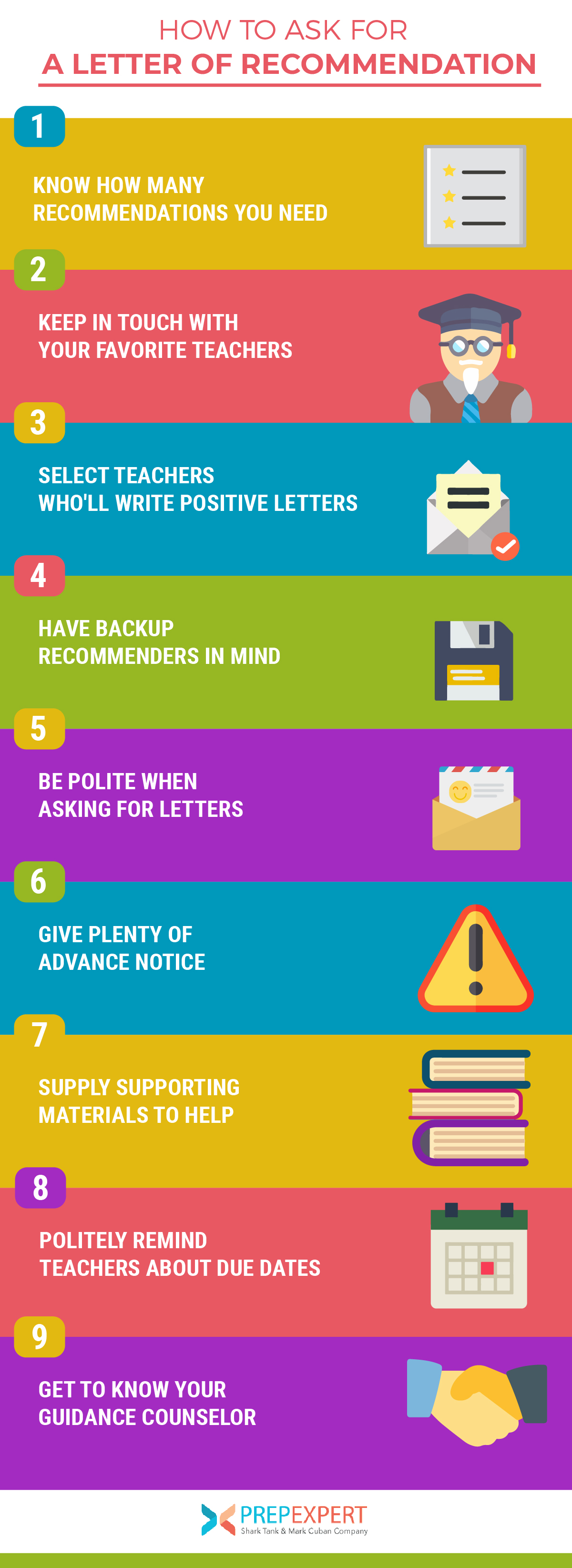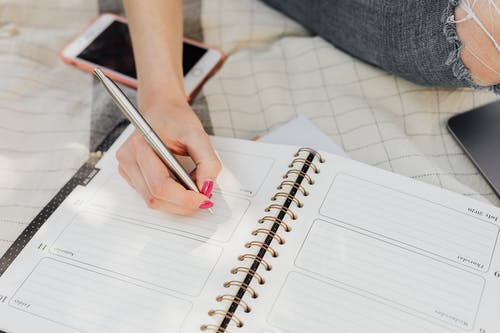How To Ask For A Letter Of Recommendation
Asking for letters of recommendation from your teachers seems like a pretty simple and straightforward task—but there are plenty of things to keep in mind before you ask for letter of recommendation help.
Be sure to keep in touch with your favorite teachers, and come application time, be sure to give them plenty of advance notice, and provide them with all the information and materials they need, to write you a glowing letter of recommendation.
More details and tips below. For more help with the college admissions process, including exam prep, consider taking an SAT prep course or ACT prep course with Prep Expert.


Know How Many Recommendations You Need
You’ll probably only need two, but some schools require more, so find out ahead of time so you’re prepared.
By and large, most schools require only two letters of recommendation, so that might be all you need. However, some schools have different requirements. You might need one non-academic reference (from a coach, a boss at your after-school job, et cetera), a peer reference, or the third letter of recommendation from a teacher.
Sometimes, these additional recommendations are optional; however, any time a school gives you an opportunity to add supporting materials to your application, you should take it. Make things easier for yourself by creating a spreadsheet for each school you’re applying to and listing the various requirements. This will help you ensure you’ve got your letter of recommendation bases covered.

Keep In Touch With Your Favorite Teachers
Stay in touch with your favorite teachers, so when it comes time to write you a letter of recommendation, they can write something detailed and truly personal.
In order to write an informed and persuasive letter of recommendation, your teachers need to remember you well and know who you are as a person. Be sure then to keep up with them after you’ve finished their classes. This could be by participating in an extracurricular activity or sport for which the teacher is an advisor or coach, or by simply checking in with them every once in awhile.
[leadmagnet_five]
You’ll want a letter from a teacher whom you’ve studied with in the recent past, so focus on teachers from your sophomore and junior years. While selecting a teacher from freshman year isn’t prohibited, you should really ask someone who has seen your recent performance. However, if a freshman year teacher happens to be your soccer coach, or the director of the school play, for example, then it’s perfectly fine to ask them to write a letter for you.

Select Teachers Who Will Write Positive Recommendations
Do some thinking about which teachers can write you the best letters of recommendation before you ask.
This may seem like a no-brainer, but you want to make sure you ask for a letter of recommendation from someone who can write a positive letter for you. If you have any reason to doubt that a teacher can write a positive letter—if you had a disciplinary issue in their class, or didn’t get a good grade, for example—then don’t ask this teacher for a recommendation! There should be plenty of other teachers who can write you a good letter, without the need to risk things by asking someone who’s an iffy choice.
The best teachers to ask for letters of recommendation are those who also know you outside of the classroom—perhaps one that’s coached you on a team, or served as an adviser to one of your extracurricular activities. Or, maybe there’s a teacher that lives in your town and has known you since you were young. These types of teachers can speak to multiple aspects of your life, not just your performance inside the classroom.

Just In Case, Have Backup Recommenders In Mind
Have a few additional teachers who could write you a good letter of recommendation in mind, in case one of your preferred recommenders isn’t able to write a letter for you.
There’s a chance that one of your favorite teachers might not be able to write you a letter of recommendation. Perhaps they’re a particularly popular instructor, and have been overwhelmed with requests; or, maybe they’ve simply got too much else on their plate, and tell you you’d be better off asking others. This isn’t too likely to happen, but just in case it does, you should have a list of three or four alternatives to turn to.

Be Polite When You Ask For A Recommendation
Remember, you’re asking your teacher for a favor—think about how he or she would like to be approached, and proceed accordingly.
For most teachers, it should be fine to simply approach them after class or during a free period to ask for a letter of recommendation. But, for others—those who have a tendency to be forgetful, or who are exceptionally busy—it might be best to compose a brief, polite email asking for a letter. Don’t be presumptuous and attach a list of schools or instructions to this particular email.
Before you overwhelm him or her with application materials, wait until your teacher responds in the affirmative, and then follow up with the related materials. This approach will also provide you a handy way to reference your recommendation with your teacher later on down the road when the letter becomes due.

Give Your Recommenders Plenty Of Advance Notice
Don’t ask your teacher for a letter of recommendation at the last minute—you’ll either get a no or a hastily-written, mediocre letter.
Your teachers are busy people. They have lessons to plan, papers to grade, and all sorts of things going on in their own lives. Plus, plenty of other students are going to be asking them for letters, too, and some teachers might have a personal limit on how many letters they’ll write per school year.
So, don’t spring a request for a letter of recommendation on your teacher at the last minute. You should give them at least six weeks’ notice, and preferably more, before the letter’s due date. This will leave them enough time to write a thoughtful, measured letter of recommendation—without begrudging you for giving them a last-minute homework assignment.
To avoid running up against time, the best thing to do is to have all your recommendation materials prepared and ready to go over the summer, so that you can ask your teachers for recommendations during the first few weeks of school.
After all, after classes begin, it’s only a few short months before early applications come due—and by that time, you’re competing with all of your classmates for your teachers’ attention. The early bird gets the best recommendations!

Don’t Make Your Teacher Ask You For Supporting Materials
Compile all the materials your teacher will need to write your letter of recommendation, and get them to him or her without being asked.
Have a file (both electronic and paper) available with all the materials your teacher will need to write you a good letter of recommendation. Most teachers will want a copy of your high school transcript, a resume (or, at the very least, a list of your extracurricular activities, volunteer commitments, and sports teams), and a piece of written work you did in their class—perhaps a graded term paper or exam.
In addition, it doesn’t hurt to include a list of bullet points with things you’d like your teacher to touch upon in his or her letter. Most teachers will appreciate this extra information. Occasionally, teachers will ask you to write a rough draft of the letter of recommendation you’re looking for, which they can then edit and personalize as they see fit.
While this isn’t the most ethical approach to take, it’s fairly common—so, if you’re preparing a draft for your teacher, make sure you hit all the points you want them to hit, and try to include anecdotes that will jog their memory about positive things to say about you.
Be sure to give your teachers all the necessary submission instructions and due dates, so they know how to submit your letters. At most schools, after you’ve registered your teacher as a recommender, he or she will get an email with instructions for creating an online account, where your recommendation can be submitted electronically.

Be Prepared To Politely Remind Your Teachers About Approaching Due Dates
Your teachers are busy, and writing your letter might slip their minds, so make sure you check in to remind them about due dates.
The best way to do this is to create a follow-up plan at the time you ask for the letter. You can give your teachers the materials they need to write the letter, and then agree to a deadline, preferably a few weeks before the letter is actually due, in case they get busy and need extra time.
However, don’t harass your teacher or check in with them an excessive amount. You don’t want your teacher to be annoyed with you while he or she is writing your recommendation letter—lest it comes across in the writing!

Get To Know Your Guidance Counselor
Make an effort to get to know your guidance counselor personally, so he or she doesn’t have to write you an impersonal, boilerplate letter of recommendation.
At many schools, guidance counselors are overworked, with responsibility for hundreds of students, all applying to schools at the same time. Even at schools where guidance counselors aren’t severely outnumbered by students, you probably see your guidance counselor only a few times a year, especially in your freshman and sophomore years. This makes it incumbent upon you to seek out your guidance counselor, and get to know him or her personally.
[leadmagnet_two]
This is because many schools will require a letter of recommendation from your guidance counselor, too, and your letter will be much better if, rather than write a one-size-fits-all submission, the counselor can add a personal touch.
For more test strategy, college admissions, and scholarship application tips sign up for our FREE class happening right now!
Written by Dr. Shaan Patel MD MBA
Prep Expert Founder & CEO
Shark Tank Winner, Perfect SAT Scorer, Dermatologist, & #1 Bestselling AuthorMore from Dr. Shaan Patel MD MBA

How to Get Into Stanford: Breaking Down Stanford Admission Requirements in 2024
Applying to college is overwhelming no matter what schools are on your list, but you might find yourself sweating a…

Why DEI is Destroying Meritocracy and How MEI Can Save Us
In recent years, Diversity, Equity, and Inclusion (DEI) initiatives have become a cornerstone of many corporate and educational policies. While…

Should I Take an SAT Prep Course?
If you’re getting ready to take the SAT soon, you might be wondering whether or not you should enroll in…